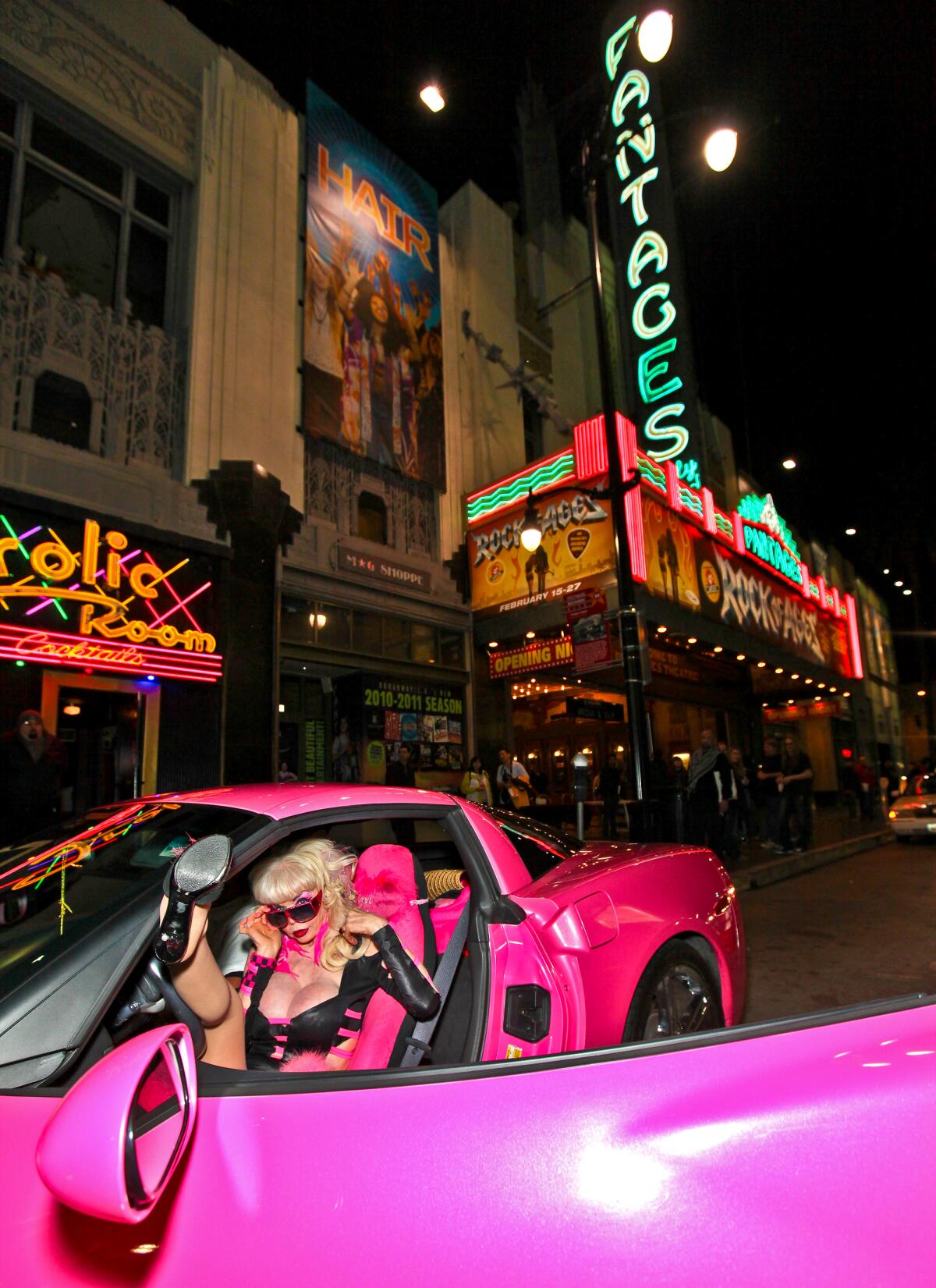Opinion: Angelyne’s status as an L.A. icon deserves a reboot

- Share via
I used to look askance at Angelyne. In the 1990s and early aughts, I’d see her around town, on one of the now-iconic billboards (image, name and nothing more) or driving her Pepto-Bismol pink Corvette like Barbie brought to life, and I would think: This is everything I like least about Los Angeles.
What I’ve come to understand, however, is that Angelyne was nothing if not ahead of her time. In the era before social media, she operated as a first-generation influencer, famous for being famous, using the mechanisms of celebrity to become a celebrity.
At the same time, unlike the influencers of the present, Angelyne has a kind of purity: Her product is herself. Not for her, Instagram photos of her college room outfitted with free items from an online retailer. Not for her, a reality TV show that helps promote a fragrance or a clothing line.
No, Angelyne’s designs on us are simpler. She has never wanted much more than to be recognized. She is paid for personal appearances and sells T-shirts from a website and the trunk of her car, but her self-construction is more existential than commercial, less a matter of campy notoriety (although that too) than something I now see as a deeply rendered and admirable act of will.
In 2017, an article in the Hollywood Reporter revealed her back story: She was born in 1950, the daughter of Polish Jews who’d survived the Holocaust. After attending high school in the San Fernando Valley, she decided — as people have been known to do in Los Angeles — to set her past aside.
Angelyne’s representatives disputed the accuracy of the Reporter’s account, but that hasn’t stopped NBCUniversal from putting it into development as a limited series. A few weeks ago the company announced that Emmy Rossum, late of “Shameless,” would be starring as Angelyne on Peacock, NBC’s new streaming service, in the spring.
If truth be told, Angelyne’s biography, and her day to day life, doesn’t interest me particularly; I read the Reporter story, but I doubt I’ll watch the show. What I find compelling is something more elusive: that Angelyne represents the psyche of this city, in which reinvention can often seem a strand of our collective DNA.
Whoever Angelyne is and wherever she came from, it is the becoming that is her legacy. She’s an icon not because of her persona exactly, but rather because she has made us pay attention in spite of ourselves.
She’s also a Los Angeles original, a vivid signifier of the place and how it operates. Image, her presence tells us, isn’t frivolous; it has substance, especially here. Angelyne may get a bad rap, regarded as trivial with her sunglasses and wedgies, her pile of platinum locks, her Barbie silhouette: a fantasy built on a cliché. But I’d suggest the truth is just the opposite. She is as serious as it gets.
It’s unclear what, if anything, Angelyne has to do with the Peacock series, or what she might get out of it. If nothing else, it could introduce her to a new generation, and in any case, an unauthorized biopic would be oddly fitting: a simulacrum based on a simulacrum based on the original simulacrum — image taken to an extreme. At the same time, I’m not sure we need a re-creation when the real person, the living, breathing Angelyne, can still be found driving the city’s boulevards.
After all, Angelyne needs to be encountered in the flesh, or at least as a larger-than-life billboard image, an element in the landscape, in three dimensions. As much as she may have prefigured the role of influencer, Angelyne is not very present on the two-dimensional internet, despite her website and a not especially well-tended Instagram feed. The digital realm is not her medium. That’s why the Corvette has always been essential — when we catch a glimpse of her, on the same streets we traverse, we are reminded of what reality is here: a complicated dance in a city that remains suspended between artifice and authenticity.
Once, back in her heyday, I attended a party in Hollywood where Angelyne had been hired to make an appearance. Up close, she looked a little peaked, pancake makeup on a tired face. But why not? She was working. It requires effort to bring illusion to life.
This is the narrative Angelyne embodies. She’s made herself a part of the city’s fabric, a monument as much as a human being. In the process, she has taught us something about what it means to live here, about the drive (yes) that it requires. She is the definition of self-made, from the persona she inhabits to the history she obfuscates. Everything I like least about Los Angeles? I don’t see it that way now. Angelyne defies both her own limits and our expectations. Like the city, her presence is a function of her resolve.
David L. Ulin is a contributing writer to Opinion.
More to Read
Sign up for Essential California
The most important California stories and recommendations in your inbox every morning.
You may occasionally receive promotional content from the Los Angeles Times.










